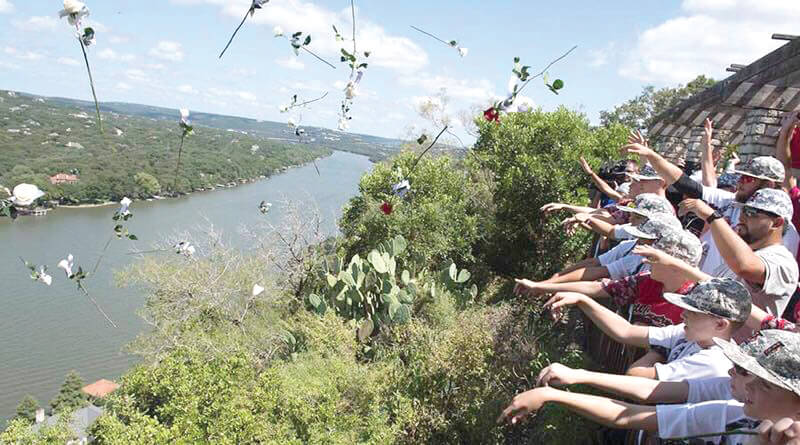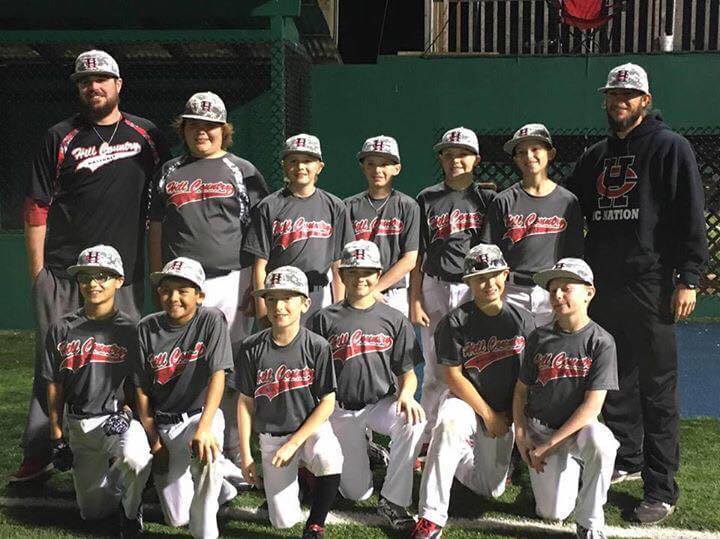
Brodie Copeland, 11, was killed last week with his dad, Sean, in Nice, France while vacationing. Brodie’s local Hill Country Baseball Club teammates gathered a few days ago to honor him.
By LYNETTE HAALAND, Four Points News
Several local youth have been dealing with the loss of their baseball teammate after Thursday’s tragedy in Nice, France when a man drove a truck through a crowd celebrating Bastille Day killing 84 people. Sean Copeland, 51, and his 11-year-old son Brodie of Lakeway were killed at that celebration while on a family vacation.
Described as a joyful boy who brought smiles to all around him, Brodie loved to act and he loved baseball. He played youth baseball with Hill Country Baseball Club since fall 2014 and his father had coached youth baseball.
Brodie and the team recently spent time together at a baseball tournament in Florida. Then just a few days ago, the team gathered to remember Brodie at a memorial service.
“This morning the band of baseball brothers gathered to honor #8 Brodie and his father, Sean. There was music, laughing, hugs and lots of Yeti cups and coolers,” one of the team parents posted on Facebook.

Brodie Copeland is third from the left on the bottom row in this Hill Country Baseball team photo. Local teammates include players from Steiner Ranch.
Teammates and families also took part in tying ribbons around trees in honor of Brodie and his father and to “unite against terror and violence,” team organizers stated.
Traumatic events, like last week in Nice, France, can evoke a variety of emotions for both children and adults.
“Reactions to a trauma may vary from sadness, grief, feelings of helplessness, anxiety and anger. These thoughts and feelings are ‘normal’ and often children who are struggling will turn to trusted adults for support and information,” said Emily McElmurry, a licensed professional counselor who lives in Steiner Ranch and works at a private practice in Lakeway.
She has been part of a lot of conversations recently about caring for family during traumatic events.
McElmurry said that predicting how a youth will respond to trauma is difficult. Responses can vary based on age, their personal experience related to the current event, previous experience with trauma, support system, or disruption in daily routine.
What can parents do?
• Supporting a child or youth to feel connected, cared for and loved are the most important ways to help during a time of crisis. Keep a routine and do familiar things, like going out for ice cream.
• Start a conversation and listen to them. Avoiding the subject and silence suggests that it is not okay to talk about or that you do not know what has happened, which can make the trauma more threatening to the child. Ask what the child already knows and clarify and misinformation, fears, concerns or misconceptions. Encourage the child to ask questions and seek answers when they are not sure and let them know they can express their feelings.
• Let them tell their story through words, play and even art. Repetition is a good thing.
• Provide hope by reminding youth that their reactions are expected and will decrease over time, they can and will feel better.
• Limit media exposure and monitor adult conversations about the situations. Information from media can help to inform and educate about recent event, but it also has the potential to confuse and upset. Not understanding information and repetition of images can be upsetting and possibly lead to more negative reactions.
• Be a role model, share personal thoughts and feelings at a level they can understand.
• Talk about successful community efforts such as response of emergency personnel and how others have helped.
• Go back to the basics by reducing stress through proper exercise, sleep and nutrition.
McElmurry said that it is important to remember that children and youth are usually quite resilient but that it is important that adults be attuned to possible negative long term reactions.
If a child or youth continues to have behaviors such as trouble sleeping, change in appetite, constant worry/anxiety, avoiding the things they have enjoyed in the past, irritability, jumpiness, concentration and attention, then it may be time to seek a pediatrician, family physician, or a local mental health profession, she said.
“Extra patience, care and love can go a long way when we are all recovering from recent events,” McElmurry said.
The National Child Traumatic Stress Network has a website at www.nctsn.org with more information. Also McElmurry teaches a local course entitled Mental Health First Aid that touches on those dealing with trauma. She can be contacted at (512) 638-7260.
